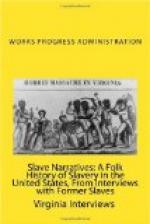Pointing to one of the pictures, he remarked, “That was me at 37. Had it taken for my boss where I worked. It was a post card, and then I had it enlarged for myself. That was just before I married Helen”.
Helen Comer, nee Cruitt, was a widow with four youngsters when he met her 54 years ago. One year later they were married and had two boys, Charles, now 47, employed as an auto repair man, and Samuel, 43, a sorter in the Post Office, both bachelors.
“Yes sir, I sure was healthy-looking them days. Always was strong, never took a dollars worth of medicine in fifty year or more till I had these last sick spells. But we had good living in slave days. In one sense we were better off then than after the war, ’cause we had plenty to eat. Nowadays, everybody has to fen’ for himself, and they’d kill a man for a dime.
“Whip the slaves? Oh, my God! Don’t mention it, don’t mention it! Lots of ’em in Old Dominion got beatings for punishment. They didn’t have no jail for slaves, but the owners used a whip and lash on ’em. I’ve seen ’am on a chain gang, too, up at the penitentiary. But I never got a whipping in my life. Used to help around the grocery, and deliver groceries. Used to go up to Jeff Davis’ house every day. He was a fine man. Always was good to me. But then I never quarreled with anybody, always minded my own business. And I never was scared of nothing. Most folks was superstitious, but I never believed in ghosts nor anything I didn’t see. Never wore a charm. Never took much stock in that kind of business. The old people used to carry potatoes to keep off rheumatism. Yes, sir. They had to steal an Irish potato, and carry it till it was hard as a rock; then they’d say they never get rheumatism.
“Saturday was our busy day at the store; but after work, I used to go to the drag downs. Some people say ‘hoe down’ or ‘dig down’, I guess ’cause they’d dig right into it, and give it all they got. I was a great hand at fiddlin’. Got one in there now that is 107-year old, but I haven’t played for years. Since I broke my shoulder bone, I can’t handle the bow. But I used to play at all the drag downs. Anything I heard played once, I could play. Used to play two steps, one of ’em called ’Devil’s Dream’, and three or four good German waltzes, and ’Turkey in the Straw’—but we didn’t call it that then. It was the same piece, but I forget what we called it. They don’t play the same nowadays. Playin’ now is just a time-consumer, that’s all; they got it all tore to pieces, no top or bottom to it.
“We used to play games, too. Ring games at play parties—’Ring Around the Rosie’, ‘Chase the Squirrel’, and ‘Holly Golly’. Never hear of Holly Golly? Well, they’d pass around the peanuts, and whoever’d get three nuts in one shell had to give that one to the one who had started the game. Then they’d pass ’em around again. Just a peanut-eating contest, sorta.




